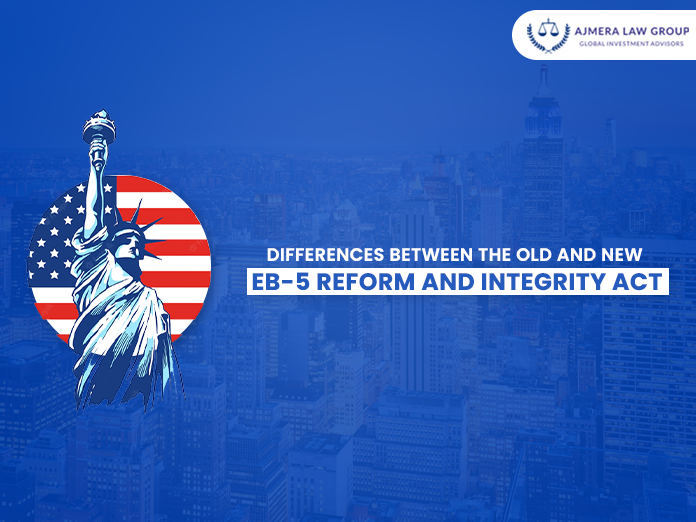The EB-5 visa category is an easy and straight forward option to obtain a Green Card through investment in the United States. The program is designed for foreign nationals who desire to immigrate to the US and start a business or invest in an existing business that contributes to the US economy.
On 15th March, 2022, the US government launched the new EB-5 Reform and Integrity Act 2022.
As a one of the leading Immigration lawyer in India, we have highlighted some of the important new provisions in this new Act.
Reasons for updating the existing Act:
- Preventing frauds
- Promoting and reforming foreign capital investment
- Creating jobs in American Communities
The Act lists new compliance requirements that have to be adhered to by the following entities:
- Regional centers
- New commercial enterprises
- Job creation entities
- Direct and third-party promoters
- Migration agents
- Companies and professionals involved with regional centers
Salient differences between the old and new Act and regulations:
Job creation
Earlier, each investor had to create 10 jobs irrespective of whether they were direct or indirect jobs. As per the new Act, each investor has to create at least 10 jobs of which 90% can be indirect jobs. If the construction work lasts for less than 2 years, only 75% of the jobs are accepted as indirect.
Regional Centre (RC) approval
As per the old Act, RC approval by the state government was mandatory but not by USCIS. However, the new Act stipulates that RCs will now require mandatory approval by the USCIS (United States Citizenship and Immigration Services). As an associate of US Immigration attorney in India, our law firm can assist in obtaining RC approval for our clients.
EB-5 business plan
In the old Act, it was left up to the discretion of regional centers whether they wanted to get approval of their business plan before filing an EB-5 petition. Now, investors can file for EB-5 petition only after receiving approval of their RC’s business plan. As an associate of US Immigration lawyer in India, our law firm can assist in obtaining business plan approval for our clients.
Failure to comply with the Act and regulations
Earlier, USCIS could not take any action in case any RC failed to comply with the Act and its regulations. Now, USCIS can suspend or terminate the RC in case of non-compliance.
Investment
Investors had to invest US$ 500,000 and $1,000,000 under the old Act that was effective before 15th March, 2022. Now, investors must invest US$ 800,000 and $1,050,000 to file an EB-5 petition.
Additionally, the US Government has come up with some new regulations in the EB-5 Reform and Integrity Act 2022. They are as listed below:
RC record keeping and audit
USCIS shall conduct an audit of the RC every five years. Hence, RCs have to maintain records for five years.
RC’s annual statement
All regional centers have to maintain and share the annual statement with the investors. If they do not follow the requirement, USCIS can demand a minimum penalty of 10% of the total amount invested.
Annual fees by RCs
If the number of investors is less than 20, RCs have to pay annual fees of US$ 10,000 to the USCIS. If the number of investors is more than 20, RCs must pay annual fees of US$ 20,000.
Petition fees by RCs
RCs must contribute US$ 1,000 per petition to create funds so that they can recover the costs of adjudication and naturalization.
Administration of investment amount by investors
The US government has added a specific provision for an escrow account. The RC must have a 3rd party fund administrator, such as a USA licensed lawyer, CPA or broker/dealer to administer the EB-5 investors’ funds.
Marketing and Migration agents:
All marketing and migration agents appointed by the RC must be registered with the USCIS.
Conclusion:
To stop frequent frauds and create jobs for American communities the US Government launched the EB-5 Reform and Integrity Act 2022 with more stringent and well-defined regulations. For more information, please contact our law firm.












